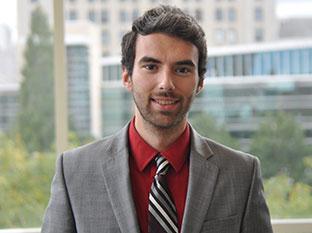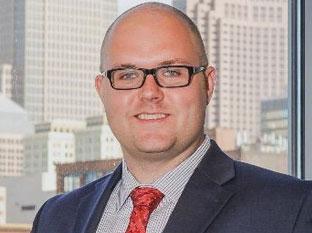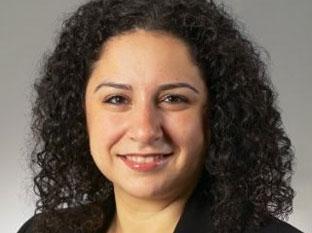
One of the most significant employers of recent graduates are “small firms.” These firms are giving freshly minted C|M|LAW lawyers major opportunities for growth while working on cases from almost their very first day.
“Small firms” are defined by C|M|LAW’s Career Planning Office as those employing between two and 10 full-time attorneys. On average, approximately one-fifth of C|M|LAW graduates have secured their initial post-graduate, full-time, long-term employment as attorneys in small firms throughout Northeast Ohio.
“When it comes to law firm hiring, the small firms are the biggest employers of our graduates,” said Heather DiFranco, C|M|LAW Director of Career Planning. “These small firms provide our students and graduates with the opportunity for immediate responsibility, direct client engagement and involvement in all aspects of a legal matter right from the beginning.”
Some students see entering the legal profession at a small firm as a viable option even before entering law school, believing such a firm will be the place they can make the largest impact. Many others realize it is an attractive option after clerking with a firm of modest size early in their law school careers.
The biggest benefit that recent graduates and law clerks point to for working in a small firm is the hands-on experience available to developing attorneys. The breadth of experience available includes the scope of subject matters covered as well as handling all parts of cases, including taking active roles in litigation.

“Being in a small firm creates the opportunity for me to handle a variety of subjects and responsibilities I would never have at a big firm,” said Daniel Copfer ’16, an attorney at Gioffre & Schroeder, LPA. “I have already been a part of four trials and recently carried a custody trial by myself where I conducted the open, cross-examined four witnesses, directed three witnesses, and conducted a closing argument.”
In addition to the valuable experience, recent C|M|LAW graduates point to the culture within small firms as an important benefit that makes the work attractive and can help allow for a work-life balance.
“I think the main benefit to working with a small number of attorneys is the family-like atmosphere that develops, since these people are investing in you, in your future , so they are rooting for your growth and success,” said Copfer. “There is no competition here ─ everyone is working toward the same goals. When we complete big cases, every attorney and staff member at the company goes out for lunch and drinks. I do not think you can have that kind of bonding experience at a big firm.”
As part of that enhanced culture, small firms allow junior associates to work much more closely with every member of the firm’s staff and benefit from their expertise.
“I am able to spend a lot of time with the partners of our firm, and having access to their knowledge reservoirs and to be able to kick around is a great benefit to me as a young attorney,” said Ayden Ergun ’16, an associate attorney at Moore Yourkvitch & Dibo.
“The attorneys who I work with have served as my mentors and have taught me to be a better critical thinker, writer, and litigator,” said Lauren Orrico ’15, an associate attorney at Kehoe & Associates. “Close relationships have filled in the gaps between education and practice to help me avoid common mistakes of new lawyers. Additionally, getting to know attorneys on a personal level means they are invested in my future in a real way, and often means I can ask for the opportunities and experiences I want.”

The ability to work closely with partners and to learn the details of their work is also extremely beneficial when it comes time for what is often the next career step for associates working at a small firm – becoming a partner at an established firm or forming their own small firm. That was the experience for 2010 C|M|LAW graduate Allen Tittle, who worked as an associate attorney at a pair of local firms before starting Tittle & Perlmuter as a founding partner in 2015. Title always knew it was a matter of time before he went out on his own, but used the valuable and immediate experience – including taking a deposition the same week he got sworn in by the Supreme Court after passing the bar examination – to ramp up in preparation of starting a firm focused on medical malpractice and personal injury.
“The great thing about getting my start at a small law firm is I had the chance to gain real experience immediately,” said Tittle. “The small firm I started at was a boutique firm focusing solely on medical malpractice and personal injury, and this allowed me to focus in one area of the law and quickly build real expertise.”
Now two years into its operation, Tittle & Perlmuter has hired law clerks from C|M|LAW, providing some of the same experience Tittle received during his law clerk positions. This is not uncommon, DiFranco noted, stating that a significant portion of law clerks and first-time attorneys are hired at firms headed by C|M|LAW alumni. These alumni often work directly with C|M|LAW’s Office of Career Planning, using the law school’s career planning resources to identify talent, share and promote opportunities, and receive data and information on salary, training and feedback.

One such alumna working with C|M|LAW’s Office of Career Planning is 2008 graduate Nathalie Dibo, a partner at Moore Yourkvitch & Dibo. Like Tittle, she previously worked at a small, local firm and benefitted greatly from receiving hands-on experience and managing teams of attorneys before starting her current firm. Moore Yourkvitch & Dibo employs seven attorneys, including three partners who all graduated from C|M|LAW, and the firm has hired several associates and law clerks from Cleveland-Marshall, including Ergun, by offering hands-on experience and the chance to truly taking ownership over cases. The Cleveland-Marshall-based camaraderie at the firm only furthers the role as a mentor that the partners provide for associates.
“I didn’t have many mentors while I was in law school and that motivates me to make myself available to others who are seeking mentors,” said Dibo. “Coming from the same school also gives us an immediate common ground to build a positive relationship on.”
